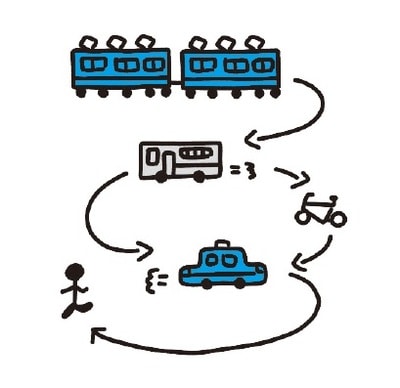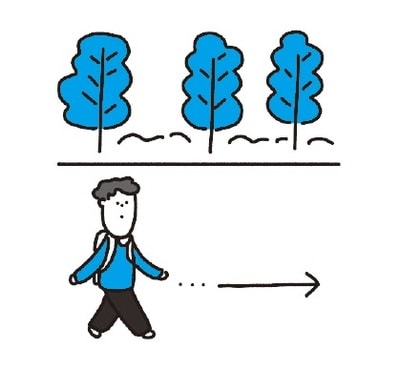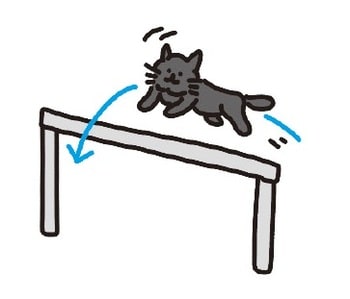「流行る」は「go around」。goを使った句動詞*
(*2語以上で一つの動詞の役割を果たす語句のこと。「動詞+副詞」「動詞+前置詞」「動詞+副詞+前置詞」の3パターンがある。)

◆go after sth/sb(~を追いかける)
⇒The police went after the shoplifter, but he got away.(警察は万引き犯を追ったが、彼は逃げ切った。)
◆go against sth/sb(~に反する、~に合わない、~に逆らう)
⇒Bringing your pet snake to the office goes against company rules.(ペットの蛇をオフィスに連れてくることは、会社の規則に反する。)

出所:Mayu、Forrest Baker共著『パパッと頭に入る 英語の動詞図鑑』(KADOKAWA)
◆go ahead(進める、どうぞ)
⇒Forrest:Can I finish your french fries?(残りのポテト食べてもいい?)
Mayu:Go ahead!(良いよ!)
◆go along with sth/sb(〔話や意見など〕にのる、従う)
⇒I went along with my boss’s plan even though I didn’t think it was a very good idea.(正直あまり良い考えだとは思わなかったが、私は上司の計画に賛同することにした。)
◆go around(sth/sb):
①(~を)動き回る、旅行する
⇒It’s easy to go around Tokyo using public transportation.(公共交通機関を使って東京を旅するのは簡単だ。)
②広まる、流行る
⇒There’s a rumor going around that Josh actually wears a wig.(ジョッシュは実はカツラなんじゃないかという噂が広まっている。)

出所:Mayu、Forrest Baker共著『パパッと頭に入る 英語の動詞図鑑』(KADOKAWA)

出所:Mayu、Forrest Baker共著『パパッと頭に入る 英語の動詞図鑑』(KADOKAWA)
◆go around doing(~して回る、しまくる)
⇒You can’t go around hitting on all the women in your office. You’re gonna get fired.(職場の女性全員を口説いて回っちゃだめだよ。クビになるよ。)
◆【超重要】go away:
①どこかへ行く
⇒Go away. You’re annoying.(どっか行って。イライラする。)
②なくなる、消える
⇒I didn’t take any medicine for my cold, but it went away on its own after a few days.(風邪をひいたとき、薬は何も飲まなかったが、数日後には勝手に症状が消えた。)
◆go back(to sth/sb/doing)(〔~に〕戻る、帰る)
⇒Some people never go back to their home countries after studying abroad.(留学後に、母国に戻らない人もいる。)
◆go by(過ぎる、通り過ぎる)
⇒The older you get, the faster time seems to go by.(歳を取れば取るほど、時は早く過ぎ去るようだ。)
◆go by sth:
①~にちょっと立ち寄る
⇒Let’s go by the grocery store on the way home.(家に帰る途中でスーパーに寄ろう。)
②~で通る、~という名前で知られている
⇒Mayu: Have you ever had a nickname?(ニックネームあったことある?)
Forrest:I used to go by “Mori-chan” in my club at college, but nobody calls me that anymore.(大学の部活では、「森ちゃん」で知られてたこともあったけど、もう誰もそうは呼ばないね。)

出所:Mayu、Forrest Baker共著『パパッと頭に入る 英語の動詞図鑑』(KADOKAWA)
◆go down:
①下がる、落ちる
⇒This elevator is going down. We’ll have to wait for the next one.(このエレベーターは下に行くよ。次を待たなきゃ。)
②起こる
⇒I heard that some crazy stuff went down at Alex’s party last night.(昨日の夜のアレックスのパーティーでヤバいことが起こったって聞いたよ。)

出所:Mayu、Forrest Baker共著『パパッと頭に入る 英語の動詞図鑑』(KADOKAWA)
◆go down sth(~をずっと行く)
⇒Annie:Excuse me. Do you know how to get to the library from here?(アニー:すみません。ここから図書館への行き方をご存じですか?)
Yuri:Sure! Just go down Oak St. and it will be right on your left.(優里:もちろん! オークストリートをずっと行ったら、すぐ左にありますよ。)

出所:Mayu、Forrest Baker共著『パパッと頭に入る 英語の動詞図鑑』(KADOKAWA)
◆【超重要】go for sth:
①~を得ようと努力する、達成しようとする
⇒Go for your dream job. Even if you fail, at least you’ll know you tried.(なりたい職業のために頑張りなよ。もし失敗したとしても、少なくとも自分は努力したって思えるから。)
②~が欲しい
⇒Yo I could really go for some tacos right now.(ねえ、今めっちゃタコス食べたい。)
◆go in sth(~に入る、収まる)
⇒Ice cream goes in the freezer, not the cabinet.(アイスクリームは戸棚じゃなくて、冷凍庫に入れるんだよ。)
◆go into sth:
①~を始める、~に入る
⇒David studied philosophy in college, but he ended up going into finance.(デイビッドは大学で哲学を勉強したが、結局は金融業界に入った。)
②~に費やされる
⇒A lot of time and work goes into producing a single issue of a manga, let alone a whole series.(連載は言うまでもなく、たった1巻漫画を発刊するにもかなりの時間と労力が費やされる。)
◆go off:
①鳴る、大きな音を立てる
⇒My alarm goes off at 6 a.m. every morning, but I usually don’t get out of bed until 7.(私のアラームは毎朝6時に鳴るが、普段は7時になるまでベッドから出ない。)
②消える、止まる
⇒The lights went off in the theater as the play began.(劇が始まると同時に劇場の明かりが消えた。)
◆go off on sb(~に対して怒りをむき出しにする)
⇒I can’t believe she went off on her boyfriend like that in public. That was really hard to watch.(彼女が彼氏に対して公共の場であんなふうに怒るなんて信じられない。見るに堪えなかった。)
◆【超重要】go on:
①続く
⇒Oh my gosh, the meeting this morning went on for three hours. It could have just been an email.(ああもう。今朝の会議3時間も続いたよ。メールでも済んだ話なのに。)
②起こる
⇒There are always things going on in New York City.(ニューヨーク市では常に何かが起こっている。)
◆go on sth:(〔旅など〕に出る)
⇒I went on a trip to Thailand and ate a bunch of spicy food.(タイに旅行して、辛い食べ物をたくさん食べた。)
◆【超重要】go out:
①出る、外出する
⇒I want to finish this assignment by Thursday so I can go out Friday night.(金曜日の夜に外出するために、木曜日までにこの課題を終わらせたい。)
②付き合う、デートする
⇒Wow. I heard those two have been going out since high school. It’s amazing that they’re still together.(わお。あの二人は高校からずっと付き合ってるって聞いたよ。まだ続いてるなんてすごいね。)
③消える
⇒One time, the power went out while I was watching a horror movie. I was so scared I almost started crying.(あるとき、ホラー映画を見ている間に停電して、怖すぎて泣き出しそうになった。)
◆go over(近づいていく、訪問する)
⇒I went over to the Philippines for spring break, and the beaches were absolutely gorgeous.(春休みにフィリピンに行ったんだけど、ビーチが本当に素敵だった。)
◆【超重要】go over sth:
①~を超える、~を飛び越える
⇒We have to plan carefully so that we don’t go over budget.(私たちは予算を超えないために慎重に計画しなければならない。)
②~を詳しく調べる、~に目を通す
⇒Make sure you go over all your slides before the day of the presentation.(プレゼン当日前に全スライドに目を通すように。)

出所:Mayu、Forrest Baker共著『パパッと頭に入る 英語の動詞図鑑』(KADOKAWA)

出所:Mayu、Forrest Baker共著『パパッと頭に入る 英語の動詞図鑑』(KADOKAWA)
◆【超重要】go through sth:
①~を通り抜ける
⇒I went through a long tunnel on the way to Niigata.(新潟に行く途中で長いトンネルを通り抜けた。)
②~を経験する
⇒She went through a lot of hard times to get where she is today, but it’s made her a really strong person.(彼女は、今の地位につくためにたくさんの辛いときを経験したが、そのおかげで、とても強くなった。)

出所:Mayu、Forrest Baker共著『パパッと頭に入る 英語の動詞図鑑』(KADOKAWA)
③~を調べる、よく探す
⇒I went through all my coat pockets looking for my keys, but I couldn’t find them.(鍵がないかコートの全部のポケットをよく探したが、見つからなかった。)
④~を使い果たす、~を平らげる
⇒I can’t believe you went through an entire liter of ice cream in one day...(1日でアイスクリームを丸々1リットル平らげたなんて信じられない。)
◆go together(合う)
⇒They go together like salt and pepper.(彼らは、塩と胡椒ぐらいお似合いだね。)
◆go up(上がる、昇る)
⇒Prices have been going up lately.(最近は物価が上がっている。)
◆go up to sb/sth(~に近寄る)
⇒Some people have a hard time going up to strangers to ask for directions.(道を尋ねるために知らない人に話しかけるのに苦労する人もいる。)
◆go with sth/sb(~に合う、~と似合う)
⇒That tie doesn’t go with your shirt.(あのネクタイはあなたのシャツには合わない。)















